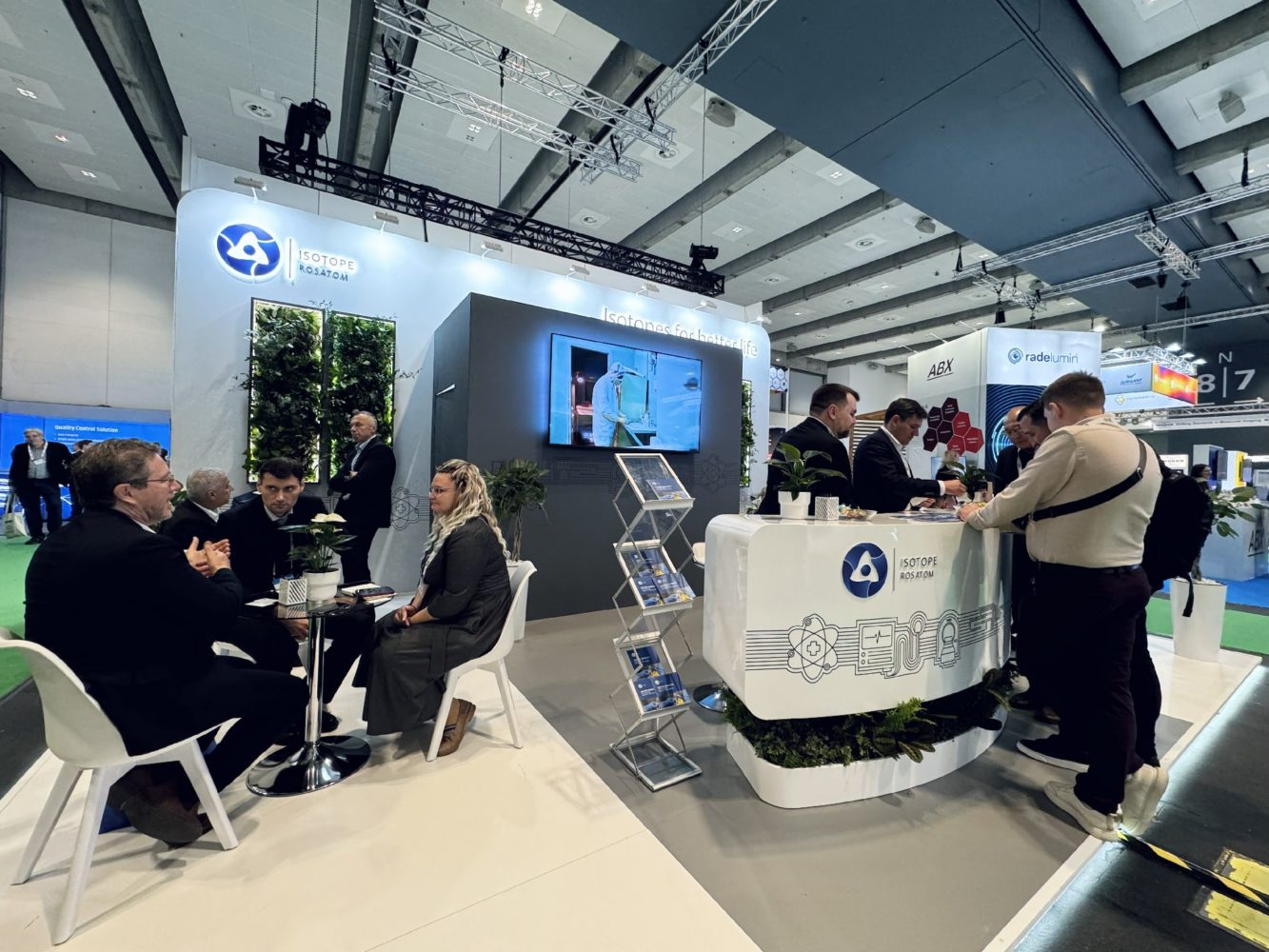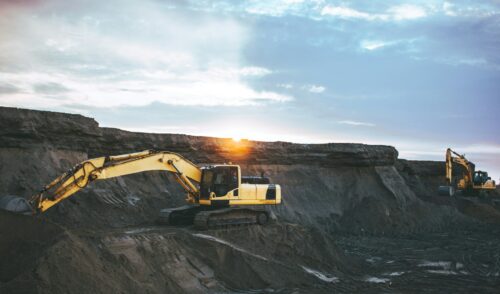
Nuclear medicine
back to contentsNuclear medicine is a key non-energy application of nuclear technology and an important business dimension for Rosatom. This business comprises production of medical isotopes and radiopharmaceuticals, development of medical devices, and construction of nuclear medicine centers.
Nuclear medicine is not a totally new business for Rosatom. The USSR held global leadership in using nuclear technology in medicine, producing about 140 radioactive isotopes and 40 radiopharmaceuticals for domestic needs and for export. The country operated 650 radionuclide diagnostic laboratories that conducted over 1.5 million studies annually, and 20 radionuclide therapy departments with a total of 2,000 beds.
At present, Rosatom maintains its leading position in the radioisotope segment, being among the Top 5 global suppliers and producing the widest range of radionuclides. Demand for Rosatom’s radioisotope products is steadily growing: in 2023 alone, annual isotope exports increased by 15 %. Around 2.5 million diagnostic and therapeutic procedures are performed worldwide using Rosatom’s isotopes, which are supplied to more than 170 companies in 50 countries.
However, Rosatom does not restrict itself to the production of isotopes and enters new segments of the nuclear medicine market.
Radiopharmaceuticals
Rosatom is building Europe’s largest radiopharmaceuticals factory in Obninsk, Russia. The decision to set up the factory was taken after the Russian nuclear corporation had analyzed the market in consultation with the medical community and identified the most demanded products and undersupplied segments. Its product range and capacity were planned with regard for Rosatom’s capabilities, product specifics, competition and consumer environment. The factory will produce dozens of substances for diagnostics and therapy of oncological, cardiovascular and neurodegenerative diseases in compliance with GMP standards.
 Production will start with the most in-demand substances, including technetium 99m generators for diagnosing more than 20 diseases and iodine 131 based radiopharmaceuticals for treating thyroid cancer and neuroblastoma in children. Samarium 153 based drugs reduce pain and inhibit bone metastases. Radiopharmaceuticals containing radium 223 are used for the treatment of bone metastases in patients with castration-resistant prostate cancer.
Production will start with the most in-demand substances, including technetium 99m generators for diagnosing more than 20 diseases and iodine 131 based radiopharmaceuticals for treating thyroid cancer and neuroblastoma in children. Samarium 153 based drugs reduce pain and inhibit bone metastases. Radiopharmaceuticals containing radium 223 are used for the treatment of bone metastases in patients with castration-resistant prostate cancer.
The factory will also produce innovative radiopharmaceuticals based on carrier-added and non-carrier-added lutetium 177, actinium 225, thorium 227 and other isotopes intended for the treatment of inoperable metastatic forms of malignant neoplasms.
By now, shell and core works, including glazing, facade cladding and thermal envelope, have been completed at the factory site. Work is currently underway to finish the interior and pave the adjacent territory, bringing the equipment installation phase much closer.
Medical equipment
Rosatom develops and supplies high-tech equipment for nuclear medicine. For instance, the company is working on the project to develop a superconducting magnetic resonance imaging (MRI) scanner. It also manufactures multi-channel dosimeters for clinical applications and has been supplying hospitals with Brachyum gamma therapy systems since 2022.
Brachyum is a device for contact radiation therapy of oncologies. It is when a gamma radiation source is delivered close to the tumor or introduced into the affected tissue with a minimal exposure for healthy tissues. The device is equipped with an advanced dosimetry unit and a 3D radiation mapping system enabling accurate, real-time therapy progress and exposure monitoring. Brachyum applicators are compatible with various diagnostic imaging systems.
Rosatom is expected to launch mass production of superconducting MRI scanners in 2027. They will produce a 1.5T-strong magnetic field, which is enough for detailed and clear visualization of internal organs.
Rosatom is studying the possibility of entering the markets of the CIS, BRICS, Middle East, Southeast Asia, Latin America and Africa with its medical equipment products.
NRTC
Rosatom is eager to share its expertise in nuclear medicine with partners. For example, the nuclear corporation is building a nuclear research and technology center (NRTC) in Bolivia. One of its components, a cyclotron, was put in operation in 2023 and has been used for the production of radioisotopes and radiopharmaceuticals. Its product range includes radiopharmaceuticals containing fluorine 18 (for diagnosing oncological and cardiological diseases), carbon 11 (for detecting brain tumors), iodine 123 (for diagnosing thyroid pathologies) and technetium 99m (used in a variety of diagnostic applications).
The key component of the NRTC, a research reactor, will be capable of generating isotopes for medical purposes. In late October this year, the initial batch of nuclear fuel for the reactor passed factory acceptance tests at TVEL (Rosatom’s nuclear fuel division). Its shipment is scheduled for 2025. The Nuclear Research and Technology Center is expected to be fully operational in the same year.
 Rosatom is currently working on the project to build a similar NRTC in Vietnam. In September this year, Rosatom Director General Alexey Likhachev and Vietnamese Minister of Science and Technology Huynh Thanh Dat discussed a construction program for the NRTC. The time schedule was set forth in the inter-agency memorandum signed during the visit of Russian President Vladimir Putin to Vietnam in June 2024.
Rosatom is currently working on the project to build a similar NRTC in Vietnam. In September this year, Rosatom Director General Alexey Likhachev and Vietnamese Minister of Science and Technology Huynh Thanh Dat discussed a construction program for the NRTC. The time schedule was set forth in the inter-agency memorandum signed during the visit of Russian President Vladimir Putin to Vietnam in June 2024.
Sharing experience
Rosatom is a regular participant of international events dedicated to nuclear medicine. In July, Rosatom co-organized the first high-level BRICS International Forum on Nuclear Medicine for representatives of the BRICS member states to discuss the opportunities and needs of their countries, propose development ideas, and exchange views. In October, Rosatom experts took part in the European Association of Nuclear Medicine (EANM) Congress 2024 in Hamburg. They presented Russian isotope products and nuclear medicine solutions and spoke about the corporation’s capabilities in this field.




